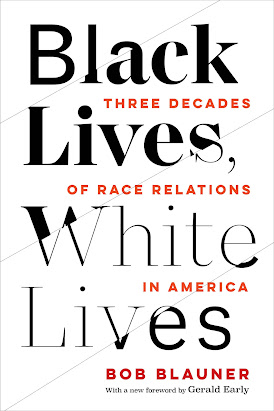The new foreword to Black Lives, White Lives by Gerald Early is beautifully conceived and written, with so much intellect, heart, wisdom, and great cultural knowledge, Bob would have felt very honored – I will venture to say, he does feel happy and honored. I want to share short fragments from the very beginning, middle, and very end of Mr. Early’s essay to give you a tiny taste.
Sociologist Bob Blauner’s Black Lives, White Lives reads very much as if were a documentary film put on paper with ever-shifting talking heads, ever changing perspectives about race relations in the United States at these distinct moments, 1968, 1978-1979, and 1986. It is both immediate and epic.
…The preoccupation with speech and the complexities of orality is what makes Black Lives, White Lives come alive, actually work, as a conversation, the informants speaking not only with and against the others in their racial section, but with and against others in the section where the informants of the other race are holding forth. Four hundred people, Black and White, men and women, were interviewed for this project. Twenty-eight are featured in the book, sixteen Blacks and twelve Whites.
…There are number of classic post-World War II sociological texts, works that actually gained popular audiences such as C. Wright Mills’s The Power Elite, David Riesman’s The Lonely Crowd, Jane Jacobs’s The Death and Life of Great American Cities, and such influential race studies as Gunnar Myrdal, An American Dilemma, E. Franklin Frazier’s Black Bourgeoisie, Wilson Julius Wilson’s The Declining Significance of Race, Tricia Rose’s Black Noise, and Charles Keil’s Urban Blues. These books, in one way or another, changed my mind and moved my heart. Bob Blauner’s Black Lives, White Lives is another.
Gerald Early
Washington University
St. Louis, Missouri




Comments